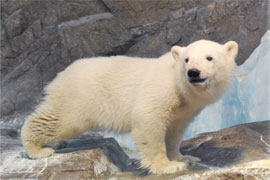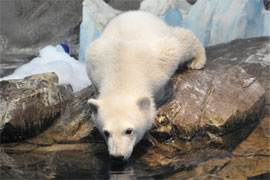Safari&Marine ホッキョクグマのお引っ越し 〜ホッキョクグマの子の試練〜

2010年4月16日、ホッキョクグマの子グマは両親が暮らしている海獣館に引っ越しました。生後6ヶ月を過ぎ体も大きくなり、スタッフが直接育てることが次第に難しくなってきたので、直接スタッフが中に入らなくても飼育ができる場所へ移動することになりました。
これまでに子グマは4度の引っ越しを経験しています。小さな頃は環境にもすぐに慣れ、今回の引越しもすぐに慣れるだろうと思っていましたが、ちょっとしたハプニングがありました。
引越し前に子グマのために改装された展示場へ連れて行ってみることにしました。環境が変わり体調を崩してしまうかもしれないと思ったからです。新しい場所の臭いを嗅ぎ、展示場をチェックしながら歩き回っていましたが、特に興奮することもなかったため「この様子なら大丈夫だろう」とスタッフ一同安心していました。
4月16日、いよいよ新しい展示場に引っ越しです。落ち着いている様子なので1頭にしてみると、とたんに不安そうに歩き出したのです。さらに、寝室へ移動すると子グマの不安は最高潮に達したようで、「ウォー!ウォー!」と鳴き叫び始めたのです。スタッフが側にいれば鳴きやみますが、それでは意味がありません。これから過ごすことになる場所です、心を鬼にしてその場を離れることにしました。
1時間、2時間と過ぎても、建物の外にまで聞こえてくるほどの大きな声で鳴き叫んでいます。いつまでも鳴きやまない様子に心配になり、その日は寝室の横でスタッフが泊まることになりました。
一晩中鳴き続けたためか、次の日の朝には声もかれていました。その日の日中も鳴きながら歩きまわり、いつまでも落ち着かない様子に、スタッフもかわいそうになってしまい展示場の中に入っていくと、子グマはスタッフに抱きつきジャンパーに吸い付いてきます。スタッフが着ているジャンパーは、小さいころに与えた哺乳瓶の乳首のゴムに感触が似ており、子グマが大好きなものの一つです。これまで以上に強くスタッフにしがみつき、まるで「寂しかったよ、どこにも行かないで。」と訴えているようでした。そんな状態でも、食欲は旺盛だったことが唯一安心できた点でした。

子グマがなるべく早く新しい場所に慣れるようにと、様々なおもちゃを用意したり餌を与える工夫をしたりと一生懸命に考えました。日に日に展示場や寝室にも慣れ、ゴロゴロと転がったり、ガラスに体をこすりつけたりと可愛らしい姿をお客様にご覧いただいています。
今思えば、これも独り立ちするために必要な試練だったのかもしれません。生まれたときは724gと両手の手のひらに乗るほどの小さな体が、今では体重30Kg以上に成長しました。これまでにも大人になるための試練を一つずつ乗り越えてきました。小さな頃はミルクだけだったのが、離乳食を食べ始めたこと。免疫力がつき外の環境に慣れるため日光浴を始めたこと。水泳練習を始めたこと。両親のように肉を食べ始めたことといろいろあります。これからもたくさんの経験を積み重ねて大人になっていく姿を、私達は寂しい気持ちになりながらも嬉しく見守っています。
今後の成長を楽しみに日々これからの飼育を行っています。
(三木 那央子)

